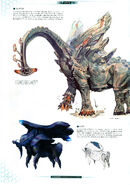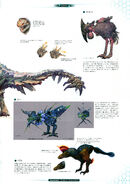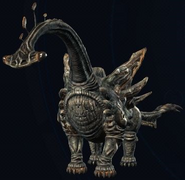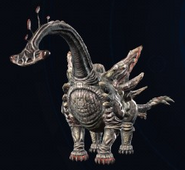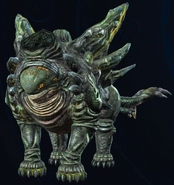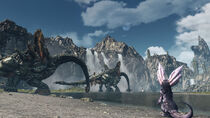
双腔龙
双腔龙 (Japanese: ミレザウロ, Mirezauro) are enormous, dinosaur-like creatures in 异度神剑X.
Description
双腔龙 are amongst the largest, physically, of all Miran 动物类. Their long trunks can move in any direction to strip trees of their leaves and plains of their grasses, while rock they have swallowed grind up this vegetation in their stomach, aiding digestion.
Though gargantuan in size, a significant portion of the 双腔龙 anatomy is dedicated to an air sac, making them much lighter than they first appear. As adults are seldom targeted by predators, they will almost never attack 其它 creatures--except when their offspring are in danger. For this reason, several 双腔龙 keep watch over their young at all times. Interestingly, direct incubation is impossible due to their size, so they use geothermal heat to keep unhatched eggs warm.
Color Variants
双腔龙 fall into two color variants. There are no differences in the materials dropped by them.
- Brown 双腔龙 are a dull brown with dark shading.
- White 双腔龙 are light grey.
List of 双腔龙
| Name | Variant | Type | Location | Time | Weather | Level |
|---|---|---|---|---|---|---|
| 「不朽」双腔龙 | Brown | Normal | 原初荒野 | Anytime | All | 51 - 60 |
| 「悠久」卢西尔 | White | 珍稀种 | 原初荒野 | Anytime | All | 92 |
| 「不动」费尔南多 | Brown | 珍稀种 | 夜光森林 | 白天 | All | 85 |
| 「永恒」双腔龙 | Brown | Normal | 原初荒野 | Anytime | All | 41 - 50 |
| 「无首皇帝」格拉迪乌斯 | Brown | 珍稀种 | 忘却溪谷 | Anytime after 第12章 | All | 71 |
| 「渴望」双腔龙 | White | Normal | 忘却溪谷 | 讨伐无首 | All |
Characteristics
The overall appearance of a 双腔龙 is similar to a brontosaurus, with a head resembling that of a hammerhead shark, large bony protrusions above the front 肩 and along the tail, and a volcano-like appendage on the back. However the apparent head and neck are actually a trunk; the true head is concealed by a large flap on the chest, and is only exposed when the false head is severed.
Etymology
The name is likely derived from the Latin word "Mille", meaning a very large number, and the Greek word "Sauros", meaning lizard.
The original name from early beta versions, アンフィコエリアス (Anfikoeriasu), may have been derived from Amphicoelias, a genus of sauropod and one of the largest animals ever discovered.

